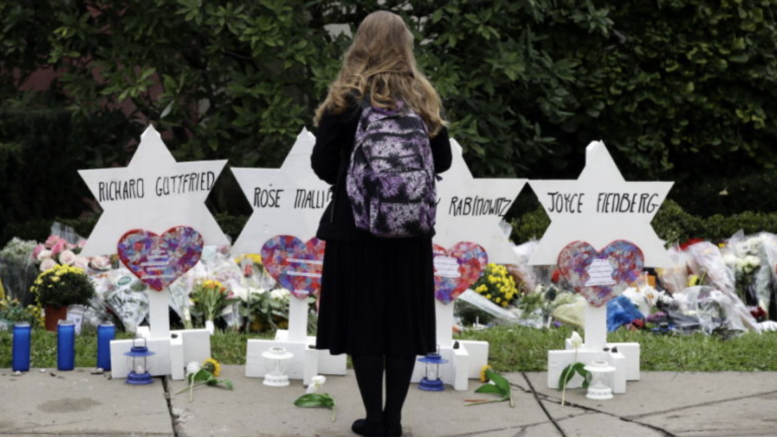RIO DE JANEIRO, BRASIL – Today, marks the 4th anniversary of the Tree of Life Synagogue Massacre, in which 11 Jews were targeted by white supremacist gunman Richard Bowers in the largest mass killing of Jews in U.S. History.
In a manifesto published online, Bowers said he targeted the synagogue because it was holding fundraisers for the Hebrew Immigrant Aid Society to help immigrants moving to the U.S.
While many people have moved on from the massacre, for Jews of the East End like me, and for those who knew people affected by the massacre and pass by the synagogue regularly, it’s still very much a part of our lives.
“Sometimes you’re just driving by like, you’re driving by the post office. And sometimes it’s like, Oh, yeah. And, you know, we compartmentalize, we put things out of our mind,” says Harry Hochheiser, a member of Dor Hadash, one of the three congregations based in the synagogue. “And then sometimes, it’s more present.”
The night before the massacre, Hochheiser was in the Tree of Life complex when he saw his old friend Dr. Jerry Rabinowitz.
The next morning Rabinowitz was attending services in the Tree of Life complex when the massacre began. He left the safety of a hiding spot in the complex to search and assist the wounded. He was later found, murdered by the gunman.
Every year on the anniversary of the massacre, Hocheiser finds himself struggling to find the words and ways to commemorate the massacre.
“I’ve come to dread the month of October, or at least the last half because of the anniversary of the massacre,” he tells me.
However, Hocheiser still thinks it’s important to remember the massacre, no matter how painful it is to him.
“We really have to continue to remember and focus on the forces and the environment that led to the shooting, that is still very much with us,” he says. “It still very much poses a threat. And that’s what’s at the top of my mind.”
After the massacre, Hocheiser became more heavily involved in the progressive Jewish group Bend the Arc. The group worked hard to elect progressive candidates, including the election of progressive Ed Gainey as the first Black Mayor of Pittsburgh. They also worked hard to elect Summer Lee as the first Black woman elected to Congress from Pittsburgh, overcoming AIPAC and its allies who spent more than $4 million to defeat her.
Like Harry, I pass the synagogue regularly. Sometimes, it’s just like driving by any other neighborhood building. You focus on the traffic in front of you, and the groceries you have to buy that day. Sometimes, it hits you. The stories of the brutality of how people have killed that day flood my memories, and I find myself breaking into tears.
As a young child, I used to catch the bus for Chatham Summer Arts Day Camp right in front of the synagogue. Nearly 20 years later as a reporter for The Guardian, I came on a chilly morning to witness SWAT Teams rescuing the synagogue, and I remember saying to myself, “Come on, boys! Come on, boys!” as they rushed to secure the building.
In a state of deep grief and shock that night, I covered a rally for immigrant rights and racial justice on the corner outside of Mr. Rogers’ old church in Pittsburgh, two blocks from the synagogue. Over 5,000 people attended the rally, but for some time afterward, I hated covering rallies in front of the church. I would find myself putting on my sunglasses to hide my tears as I thought of the terror I felt that day as a Jew who grew up in Pittsburgh.
In a struggle to deal with my grief, I consulted with Jewish SNCC veteran Ira Grupper, who had several of his friends murdered while working for racial justice in the South in the 1960s. I asked Grupper how he dealt with the pain.
“The pain never goes away,” Grupper told me. “You just remember it, it lives with you, and you fight harder because of it.”
For many of us, the pain of the massacre is still a “living pain” and changes over time. Sometimes, it helps to find joy and to fight in tough circumstances like the fight that we are currently in here in Brazil.
For years, my memories of the corner in front of Mr. Rogers’ church were of deep pain. Then in November 2020, the night when Biden was declared the winner over Trump, I watched as Orthodox Jews clad in black and college students in skimpy outfits danced all night to celebrate the defeat of Trumpism. We drank beers till the early hours of the morning on that corner, and my memories of that corner changed.
Recently, while reporting here in Brazil, I have found myself recounting stories of the parties to Brazilians nervous that the fascist president Bolsonaro could win here too. I joke and tell them that I look forward to comparing the dance parties we had that night in Pittsburgh with the parties that will happen in Brazil the night that Bolsonaro is defeated.
And as I tell them the stories of how we overcame the forces of fascism in America and how I expect the Brazilian parties to be even bigger than the one we had outside of Mr. Rogers’ Church that night, they laugh. My pain suddenly becomes something that calms other people in their own tough fights, and I think about what Harry and so many other Jewish elders have told me.
“The pain never goes away. It just gives us more resolve to keep fighting.”
Donate to Help Us Honor the Legacy of Tree of Life in the Fight for Social Justice


Be the first to comment on "Living Pain on the 4th Anniversary of the Tree of Life Synagogue Massacre"